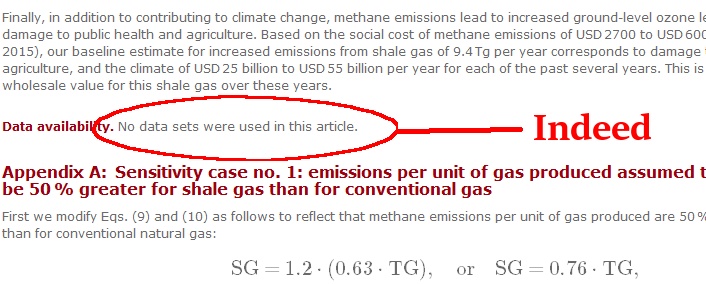A new paper by Cornell anti-fracking marine ecologist Robert Howarth (funded by the anti-fracking Park Foundation) doesn't try to tackle the physics, he just chooses to ignore it with the goal of undermining the energy which has kept prices for poor people low while reducing CO2 emissions so much that by 2017 the Clean Power Plan, which the Supreme Court had nullified in 2016, was irrelevant. After being scolded years ago for his daft claims that natural gas was worse for the environment than coal, his argument has pivoted but his desire for disinformation still persists more than methane does.(1)
He claims he can detect the difference between methane from fracking and that from other drilling. If you are in the 'I can taste GMOs and speak to dead relatives' crowd, you might believe him. No one with actual expertise in climate science or energy does.

Howarth has been debunked by actual atmospheric scientists at Cornell (2) for his past claims (when you are off by 10 percent, that is bad science, when you are off by 200 percent, it is intentional) but scientists are not his target, the New York Times is. With an unwillingness to ask actual experts the newspaper did fawn over one of his claims, but they were scolded for that by scientists and then their own ombudsman and now he may be hoping to get attention using cosmic assertions even more obscure and hard to prove (thus, impossible to refute, which is what merchants of doubt seek to gain.)
His new claim is that natural gas from fracking has less carbon-13 relative to carbon-12 than methane from both older natural gas wells and coal. Methane contains two elements, carbon and hydrogen, each with two stable isotopes. For carbon, those two are 98.9 percent carbon-12 and 1.1 percent carbon-13 (13C). As you can see, 1.1 percent means fossil carbon is relatively low in 13C and since methane contains no 14C tracking carbon-13 is a solid approach to detecting methane. But he doesn't do any science, he simply takes an estimated approach from another paper, compares it to estimates of increased methane (~25 billion tons) and then suggests because his estimate of an estimate does not coincide with measured data, fracking must be causing more methane than would be evident if methane were derived from older technologies, where he just relies on data.
That's not chemistry, it's magic. It's like when agriculture activists insist greedy corporations are irrationally dumping antibiotics on cows and pesticides on plants ignoring that it makes no sense to waste money. Energy companies are no different. They are not throwing methane around like candy at Halloween. It is money going into the air.
Methane has been terrific for North America but activists who endorsed it since the 1960s turned on it once it became viable (just as they did with corn ethanol) because that is their business model, and Howarth has become a darling to them despite having no expertise. So he has to write papers if he wants his funding sources to persist. But this is next level speculation. Instead of conceding it dissipates quickly, which is science, he uses language suggesting the atmosphere spasms more rapidly in the presence of methane. Yet at the levels we are talking about the assertion is silly, it is endocrine disruption or homeopathy for greenhouse gases; a belief that trace levels of it will cause an impact. In the voodoo fringe of biology (Fred Vom Saal, Paul Fagan, et al.), environmental activists get away with such gibberish because they can ignore obvious confounders and hope journalists will just rewrite the press release, but physicists are a lot more protective of their field.
So I predict they will be lined up to slam this. Not because they want to defend fracking or any other energy source, but because every time a bad paper gets attention because it seeks to appeal to a large political umbrella, it undermines acceptance in science overall.
NOTES:
(1) The fact remains CO2 is persistent but methane disappears quickly. If we had clean coal, which James Hansen, the father of global warming. embraced, nuclear (ditto), and natural gas, instead of creating problems by banning nuclear and using resources for government-subsidized solar panels and windmills, the IPCC target of 2 degrees would be met without environmental journalists being forced to stop flying around the world to climate conferences.
(2) Fellow Cornell academic Lawrence Cathles, an climate science expert, debunked his claim that natural gas wells are the "methane sieves" Howarth claimed and using decades-old Soviet Union-era data to massage the results didn't endear him to earth scientists either.




Comments